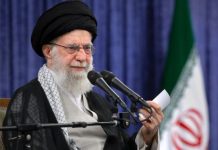Qamar Bashir
The way the ‘government’ has brought every pillar of the state under its absolute control is staggering, showcasing its resourcefulness, power, and ability to manipulate all branches of the state at will. Credit must be given to those who strategized, executed, and accomplished feats that once seemed impossible but were not only realized but achieved with flying colors. The power wielded by the ‘government’ has finally brought all three pillars of the state under their sway, seemingly following the principle that the end justifies the means.
First, the government used the Election Commission and expelled PTI from the election process, and imprisoned its leadership thereby crippling the party from within. Later sensing that PTI is still winning elections, a mechanism was put in place to alter the election results. The strategy was simple: stuff ballot boxes with bogus votes, manipulate Form 47 and fill the parliament with those who won the election thanks to the ‘government’. This gave the government total control of the parliament. Later the formation of election tribunals were made controversial and to date, they have not been formed to address allegations of rigging and settle election disputes. Later the ‘government’ ensured that only its cultivated persons from the President down to even the Ministers of State form the government.
After vanquishing the parliament and the government, the ‘government’ turned its focus to controlling the fourth pillar—the media—before targeting the judiciary. The traditional media was brought under control through a carrot-and-stick approach. Major media houses were pacified with advertising revenue, while journalists and anchorpersons who refused to comply were forced to flee the country. Those who remained were subdued through a mix of incentives, intimidation, and threats, with the fear of losing their jobs looming over those who still resisted.
Once traditional media was subdued, the government decided it was time to bring social media under control. A nationwide firewall was implemented at a cost of millions, controlling social media traffic and gaining the capability to filter any intervention that countered the government’s interests.
Now was the time to bring the most formidable pillar under its sway that too before Justice Mansoor Ali Shah could take over as Chief Justice. The ‘government’ arrayed its vanquished pillars—the Parliament, the government, the Election Commission, the Office of the President, and the media to bring down the judiciary starting with weakening the judiciary from within.
First, two judges in their minority judgment, and later the Chief Justice himself, advised the Election Commission not to implement the majority ruling and used all tactics to delay the implementation which could have restructured the entire National Assembly.
Meanwhile, the ‘government’ meticulously planned the 26th constitutional amendment to strip the judiciary of its independence, strength, and capacity to make decisions free from government influence.
The ‘government’s’ grip was so powerful that the Senate passed the far-reaching constitutional amendment within hours of its introduction on the evening of Sunday, October 20. It was endorsed by the National Assembly the very next morning, Monday, October 21, President signed the amendment without blinking his eye and its was published in the official Gazette with electric speed.
The entire process was shrouded in secrecy. The draft of the amendments was kept hidden from the public, and there were no consultations or debates before the proposals were introduced and rapidly passed by Parliament.
The International Commission of Jurists (ICJ) sharply criticized this process, stating that it flagrantly violated core principles of the rule of law and the separation of powers. According to the ICJ, the amendment undermined the fundamental right of citizens and their freely elected representatives to participate in the legislative process, which is essential in the enactment of laws. This rushed and secretive handling of such a critical constitutional change raised serious concerns about the integrity of the democratic process and the erosion of accountability.
ICJ observed that after re-composition of the Judicial Commission of Pakistan (JCP) which now consists of two members of the National Assembly, two members of the Senate and one woman or non-Muslim member, to be nominated by the Speaker of the National Assembly, the Law Minister, the Attorney General of Pakistan, and a representative of the Bar has allowed for direct political influence over it, and reduce the JCP’s judicial members to a minority. Now for the appointment of Supreme Court judges, only five out of 13 JCP’s members are required to be judges (namely, the Chief Justice of Pakistan, the most senior judge of the constitutional benches, and the three most senior Supreme Court judges).
Now it would only be the non judicial members of JCP which will nominate “constitutional benches” in the Supreme Court and High Courts to handle matters of constitutional interpretation and fundamental rights. It also empowers a Special Parliamentary Committee (SPC) to nominate the Chief Justice of Pakistan from among the three most senior judges, a process previously based solely on seniority. Furthermore, the amendment allows the Supreme Judicial Council (SJC) to recommend the removal of judges on the vague ground of “inefficiency,” without clear criteria, potentially compromising judicial independence.
According to JCP these changes are seen as a violation of both Pakistan’s Constitution (Article 10A) and international law (Article 14 of the ICCPR), undermining the separation of powers and the judiciary’s impartiality. Notwithstanding, the observation of the ICJ, the fact is that now all pillars of the state are under the iron grip of the ‘government’ and these were the politicians who made it possible.
The government appears unconcerned with the perspectives of jurists, lawyers, intellectuals, international thinkers, or even the International Court of Justice regarding these amendments. It shows little regard for the value of an independent judiciary, not only as a safeguard for the public but also, at times, as a benefit to the government itself. Currently, the people have lost faith in all pillars of the state: the office of the President, the government, the parliament, and, finally, the judiciary. Through the use of manipulative powers, the government has effectively placed the entire state under its control, prioritizing its objective without regard for the methods employed. The only institution left that retains the people’s respect is the Pakistan Army, which remains robust and perhaps stronger than ever. As a result, the people of Pakistan may now look to the army to guide the country out of its political, economic, and financial challenges, hoping that, as in the past, the country will regain stability and prosper once again.
Qamar Bashir
Former Press Secretary to the President
Former Press Minister to the Embassy of Pakistan to France
Former MD, SRBC, CEO, ATV

















